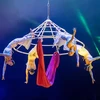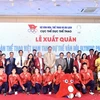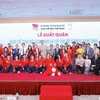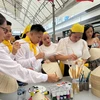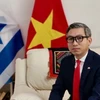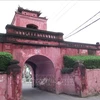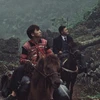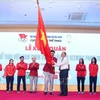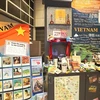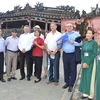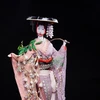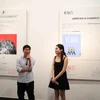Thousands gathered in the northern province of Phu Tho on April 7 for a grand procession to honour the Hung Kings, the founders of the Vietnamese nation.
Groups from Viet Tri city's suburban districts Hy Cuong, Hung Lo and Van Phu, rural district Tien Kien and Hung Son and Lam Thao townships headed to the Hung Kings Temple on Nghia Linh Mountain.
Each procession was led by dancers, followed by a group carrying national and festive flags and another group playing ritual drums and gongs and other traditional instruments.
The next group carried ritual parasols, symbolic weapons and a red lacquer palanquin trimmed with gold patterns and was followed by a train of people acting as court mandarins.
At the Hung Kings Temple, various worshipping rituals took place and offerings were presented at the temple altar.
According to Vice Chairman of Phu Tho provincial People's Committee Ha Ke San, the procession became larger when people from urban areas started participating three years ago.
"As part of the Hung Kings worshipping rituals in Phu Tho, the procession not only contributes to the preservation of this Intangible Cultural Heritage, but also raises awareness about the moral principle ‘When drinking water, remember its source'," said San, who is also head of the Hung Kings Temple Festival organising board.
According to Vietnamese legend, the 18 Hung Kings ruled during the first period of Vietnamese history, from 2879-258 BC. The worshipping rituals of the Hung Kings are closely related to the ancestor worshipping tradition of most Vietnamese families, which forms an important part of people's spiritual lives. It was recognised as a UNESCO Intangible Cultural Heritage of Humanity in 2012.
In celebration of the festival, a range of activities showcased local culture for tourists.
On April 6, a contest for making banh chung (square glutinous rice cakes) and banh day (round glutinous rice cakes) drew teams from Phu Tho, Hoa Binh, Hai Duong and Hanoi.
According to the tale, these cakes were created by Prince Tiet Lieu, the youngest son of Hung King VI. The king said he would pass on the throne to whichever son brought him the most special and unusual food. Tiet Lieu was given the throne thanks to his simple and meaningful offerings, made from rice that he had grown with his own hands.
The Hanoi team won the banh day category while the Phu Tho team triumphed in the banh chung category. The two teams will get the chance to offer their traditional cakes to the Hung Kings at the altar.
The day also marked the opening of an exhibition of photos by Phu Tho photographers. Through the photos, visitors can learn about local religious customs and enjoy the province's natural landscapes, featuring palm hills and tea farms.
An exhibition dedicated to the Hung Kings worshipping rituals was organised at the Hung Kings Temple. The display presents nearly 100 photos and objects related to the rituals, including an ancient photo of a procession during the 1905 Hung Kings Festival.
In the night of April 5, a special art performance on the theme Ve Mien Di San (Visiting the Region of Heritage) was held at Viet Tri city's Hung King Square.
Hundreds of local artists sang and danced. The show was divided into three parts: Dat To Coi Nguon (Ancestors' Land – Original Source), Ve Mien Di San and Rang Ngoi Dat To (Brilliant Ancestors' Land). The show wrapped up with a fireworks performance.
Other competitions held during the festival included wrestling, Chinese chess, crossbow and volleyball.
Alongside the Hung Kings worshipping rituals, Phu Tho is the birthplace of hat xoan (xoan singing), recognised as cultural intangible heritage by UNESCO in November 2011.-VNA
Groups from Viet Tri city's suburban districts Hy Cuong, Hung Lo and Van Phu, rural district Tien Kien and Hung Son and Lam Thao townships headed to the Hung Kings Temple on Nghia Linh Mountain.
Each procession was led by dancers, followed by a group carrying national and festive flags and another group playing ritual drums and gongs and other traditional instruments.
The next group carried ritual parasols, symbolic weapons and a red lacquer palanquin trimmed with gold patterns and was followed by a train of people acting as court mandarins.
At the Hung Kings Temple, various worshipping rituals took place and offerings were presented at the temple altar.
According to Vice Chairman of Phu Tho provincial People's Committee Ha Ke San, the procession became larger when people from urban areas started participating three years ago.
"As part of the Hung Kings worshipping rituals in Phu Tho, the procession not only contributes to the preservation of this Intangible Cultural Heritage, but also raises awareness about the moral principle ‘When drinking water, remember its source'," said San, who is also head of the Hung Kings Temple Festival organising board.
According to Vietnamese legend, the 18 Hung Kings ruled during the first period of Vietnamese history, from 2879-258 BC. The worshipping rituals of the Hung Kings are closely related to the ancestor worshipping tradition of most Vietnamese families, which forms an important part of people's spiritual lives. It was recognised as a UNESCO Intangible Cultural Heritage of Humanity in 2012.
In celebration of the festival, a range of activities showcased local culture for tourists.
On April 6, a contest for making banh chung (square glutinous rice cakes) and banh day (round glutinous rice cakes) drew teams from Phu Tho, Hoa Binh, Hai Duong and Hanoi.
According to the tale, these cakes were created by Prince Tiet Lieu, the youngest son of Hung King VI. The king said he would pass on the throne to whichever son brought him the most special and unusual food. Tiet Lieu was given the throne thanks to his simple and meaningful offerings, made from rice that he had grown with his own hands.
The Hanoi team won the banh day category while the Phu Tho team triumphed in the banh chung category. The two teams will get the chance to offer their traditional cakes to the Hung Kings at the altar.
The day also marked the opening of an exhibition of photos by Phu Tho photographers. Through the photos, visitors can learn about local religious customs and enjoy the province's natural landscapes, featuring palm hills and tea farms.
An exhibition dedicated to the Hung Kings worshipping rituals was organised at the Hung Kings Temple. The display presents nearly 100 photos and objects related to the rituals, including an ancient photo of a procession during the 1905 Hung Kings Festival.
In the night of April 5, a special art performance on the theme Ve Mien Di San (Visiting the Region of Heritage) was held at Viet Tri city's Hung King Square.
Hundreds of local artists sang and danced. The show was divided into three parts: Dat To Coi Nguon (Ancestors' Land – Original Source), Ve Mien Di San and Rang Ngoi Dat To (Brilliant Ancestors' Land). The show wrapped up with a fireworks performance.
Other competitions held during the festival included wrestling, Chinese chess, crossbow and volleyball.
Alongside the Hung Kings worshipping rituals, Phu Tho is the birthplace of hat xoan (xoan singing), recognised as cultural intangible heritage by UNESCO in November 2011.-VNA

